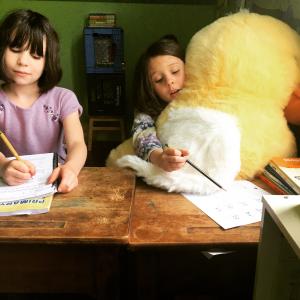I was recently introduced to the term “Intentional Parenting.” It was in the course of me waving my arms complaining about my children, and, of course, I recoiled horror. “What is that?” I cried. But I was tired at the time and didn’t really listen to the answer, so then was sent this and did read it, in a vague way. It’s a list.
Shortened up, it goes like this:
Keep God’s purposes for parenting in mind.
Get to know more about yourself as a parent. [more on this below]
Study your children.
Make sure that your life is showing your kids the right story.
Be a patient parent.
Be a grown-up parent.
Be a balanced parent.
Be a consistent parent.
Be an encouraging parent.
Be a spiritual parent.
Be a merciful parent.
Be a hopeful parent.
Be a free parent.
There is a lot said under each of these headings, and much of it is unremarkable and blandly true. Most of it could probably be summed up under the heading Don’t Be Awful. Or rather, Try To Be Human.
The one section I really didn’t like was in the Get to know yourself as a parent bit. They write:
Ask three people who know you well and will tell you the truth these questions: “What have you observed about me as a parent?” “What are the strengths I bring to parenting?” “What are the struggles I bring to parenting?” “What do you enjoy about being in relationship with me?” and “What are the challenges about being in relationship with me?”
I mean, it might be nice to know some of this, but I don’t know any parents who have time to ask these questions. And also, what on earth would you do with the information once you had it? Curl up in the fetal position? Questions like these essentially make the task of parenting into a job like so many other jobs—soulless, performative, corporate, and, dare I say it? Self-centered. Which is the one thing that parenting is supposed to save you out of. The more you concentrate on yourself and how you’re doing, the more ‘challenges’ everyone else is going to have being in a relationship with you.
Whereas, the parenting task is an essentially human one, which we don’t really know much about any more, which is why we go around looking for lists like these. When you give birth to a baby, that’s a human baby. You’re supposed to have a relationship with it, or him, or her, or whatever. One thing that doesn’t help people be more human are lists of things to do, lists that essentially come down almost to Be Perfect. When God gives such lists, he illustrates the inability of the human person to be moved or shaped by that list for thousands of pages. Then he dies on the cross, rises again, and moves in to the human heart bring about the list himself, because humans are really really bad at making it through the whole list successfully. If intentionality means adding a list to my already too long list, then you can count me out.
The best thing that anyone said to me as I was contemplating my impending motherhood was, ‘You’re Not That Powerful.’ Not only was this glorious revelation a relief, it has also proven to be true. The very excellent things I do are not much in the face of the child’s own organic, far reaching life. The child grows mysteriously, like a plant, and I can’t know in the middle of it if it is going well or not. I just have to wake up every day and live my life and try not to worry about it too much.
The child is not a product, or an outcome, but a person. And people are difficult and strange. They can’t be known in packaged categories. They change. They contradict themselves. They frequently don’t make sense to the outside eye. I myself barely know the inclinations and devices of my own person. There is no way I could reach into the soul of my child and know how it is going or what that other person really needs one way or another—beyond food and clothes and discipline and affection and an education.
For centuries human people have drug their children along with them through life, mistakes and all. But now we have a crisis of ‘intentionality’, a stopping every other moment to pull up the roots to see if anything is growing, to take credit for the mysterious work of God, to blame ourselves for the sins of others.
If I tried to work through a list like this every day I wouldn’t have time to actually parent. I also wouldn’t be myself. I would be internally crippled, tortured by an impossible and probably fruitless balancing act. Whereas, in a bit, I will get up and go yell at everyone to clean up their breakfasts, and we will all stagger through the day with our own anxieties and workloads. In the evening, or maybe at lunch time, we’ll stare at each other and complain about how the day went, or is going, and then we’ll go to bed. After a while, someone will probably explain to me—in a moment that I’m least expecting—that he is disappointed, or that something is going wrong, or that she is unhappy. And I will listen and try to be helpful, and will certainly fail.
Oh, and I’ll pray some. All the time actually. Because how should I know? Human people are glorious and ridiculous and complicated and I am bound to screw up. But also, I’m not that powerful. I can’t ruin everything. Nor can I bring a desired goodness about. I must just walk forward day by day and trust a powerful God.
#thursdaythought Be intentional if you want, but better yet, make something delicious for dinner and refuse to cater to the idiosyncrasies of every single person hanging over the back of your chair trying to get your attention. Try to force your children into being adults you want to hang about with, and when you fail, blame them for ruining your life.













